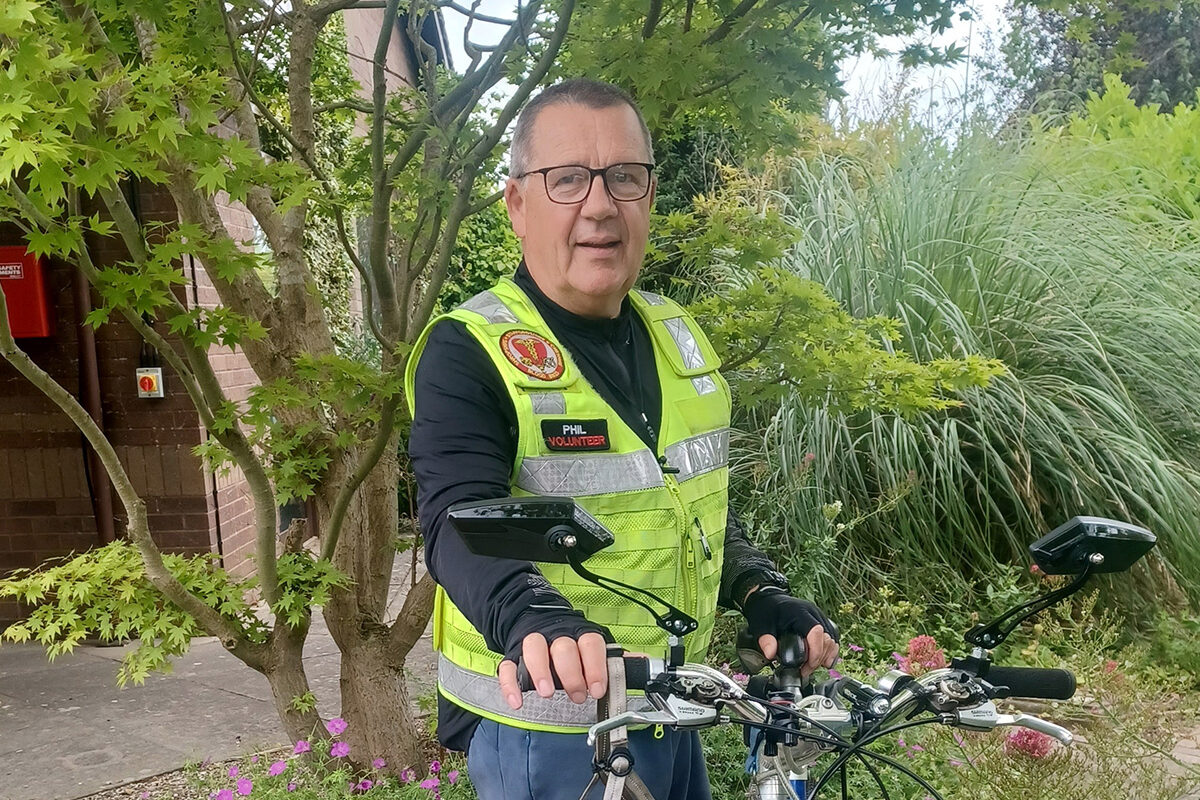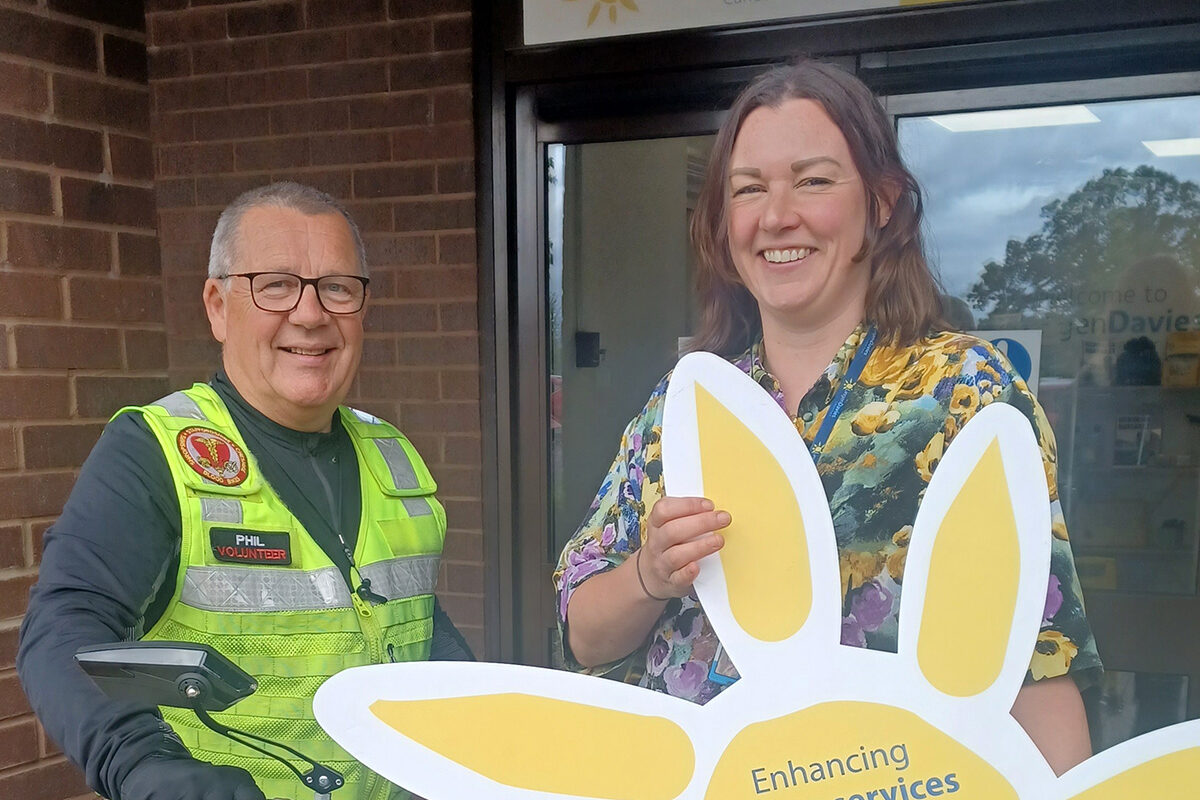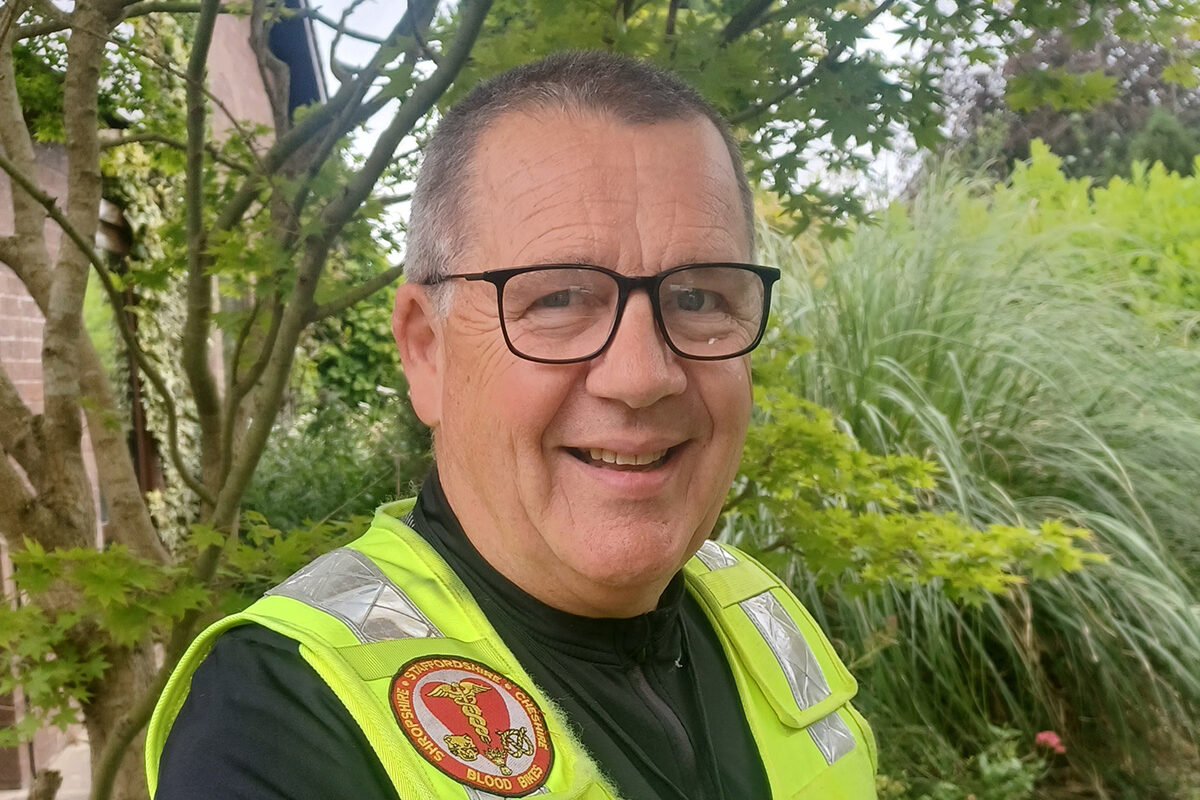Diagnosis
Phil has had two invites for bowel screening and never had any qualms about doing it.
He said it’s a ‘very simple’ test with ‘good instructions’ – you get the parcel in the post and literally just have to put a little stick in your poo. His first screening result was clear, but after being offered a repeat two years later, aged 64, it was that test in autumn 2023 which diagnosed bowel cancer.
Phil said: “I did the test, discovered it, had surgery, fixed it, done within three months. Routine screening meant it was caught early. Following the screening, I had a colonoscopy and CT scan, finding something they thought could have been a polyp, but turned out to be a tumour. “Thankfully it hadn’t yet grown through the bowel’s muscle wall. If you don’t catch them early enough, they can pop through and infect the local lymph nodes with cancer cells. Once in your lymph nodes, they can spread anywhere.”
On December 27 in the Royal Shrewsbury Hospital (RSH) Treatment Centre, Phil had an ascending colon hemicolonectomy – the removal of about 20% of the large bowel.
Double diagnosis
This was not Phil’s first cancer diagnosis. In October 2018 he was diagnosed with multiple myeloma – an incurable cancer of the plasma cells in the bone marrow. It is treatable and manageable.
He was diagnosed ‘by luck’ after going to the doctors with a belly button hernia. After the hernia repair, Phil reported acute pain in the front centre of his chest, thought at first to be a reaction to the sternum rub used to bring patients round after general anaesthetic. But an observant member of the hospital team noticed low blood haemoglobin levels, which some timely inter-disciplinary liaison led rapidly to the myeloma diagnosis.
A same-day bone marrow biopsy in his pelvis was ’nowhere near as horrible’ as Phil expected. He started chemotherapy the very next morning and six years later continues to be a regular visitor – now only every four weeks for ‘maintenance’ immunotherapy treatment – to the RSH O’Connor Unit to manage his condition.

Chemotherapy
With a background in applied science, Phil found chemotherapy fascinating.
He’s done a lot of work with animal health, diseases and medicine – always very interested in the science behind things – so was equally interested in what was happening to him with chemotherapy treatments.
“On diagnosis, my kidney function was just 15% because the over-production of cancerous plasma cells makes the blood sticky and that affects the kidneys,” he said.
“It blocks them up so I was a fraction away from needing dialysis. I had to drink a lot of water until my kidneys were back to normal, which actually only took a few days, during which I was weeing like a lot. I started the chemo regime but didn’t lose my hair or appetite, I was very lucky.” Phil’s myeloma blood counts started instantly to come down. Healthy people have a tiny amount of the protein chain indicator, in a range of 5 to 25 – whereas his on diagnosis was 7,400.
Self inject
Once treatment had brought the myeloma blood count down sufficiently, Phil was lined up for a stem cell transplant.
“This is one of medical science’s magical things!” Phil said.
“At the Blood Transfusion Unit in Birmingham, my own cells were harvested for re-infusion. In preparation, I had to self-inject a booster daily for several days to make my system increase its stem cell production. Then I had to sit in a chair for about seven hours, two days running, with blood taken from one arm, put it through a machine that takes the stem cells out then returns the dregs back into the other arm. They harvested enough cells for two transplants.
“For the transplant itself, you must be ready to move at a moment’s notice when they call you to the QE. There are a few days of prep then you have a massive dose of melphalan, a chemo drug that wipes out your bone marrow. This means temporarily you have no natural immunity to anything, so Ward 625 is a very special place that, among many precautions to protect patients from pathogens, is artificially ventilated with filtered air.
“The next day they inject your own stem cells into a vein very close to your heart to achieve maximum distribution all around your body. Then you’re confined to the ward waiting for your blood counts to improve before you can go home. Because I’m Superman, this only took about two weeks, but three to four is more typical.”
Since then, Phil still has myeloma but it is controlled and managed.

Managing treatment and the future
In early 2023, the blood counts started to rise slowly but clearly, so a new treatment began, also at The O’Connor Unit, and the count started to come down again.
“For both colon cancer and myeloma, I’m delighted to be on lifetime screening. For myeloma particularly, there’s lots of research going on collaboratively all over the world and the past six years have seen a number of new treatments become available, including the maintenance one I’m on now called daratumamab. So the future’s bright.
“I just get on with things, conscious of it all the time but refusing to worry. I’ve got various aches and pains, some I’ve had for years having played rugby during my teens and twenties! Now, I’m unable to differentiate between the effects of multiple myeloma and what is just a result of getting older.
“Overall, the reason for telling this story is that cancer screening can be a lifesaver. I believe everyone who is offered should take it.”
Family
Phil is an active man, a keen cyclist who has always tried to stay healthy and eat well. He has four siblings, and his youngest sister too has been diagnosed recently with bowel cancer, also identified by her first screening test. Two of his brothers have also had benign colon polyps spotted by screening and removed.
When asked how cancer has changed him: “Every bedtime and early morning without fail, I think deliberately how grateful I am to be here. I genuinely appreciate my life more.”
